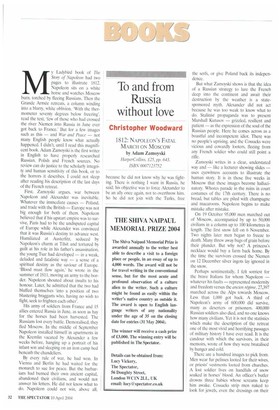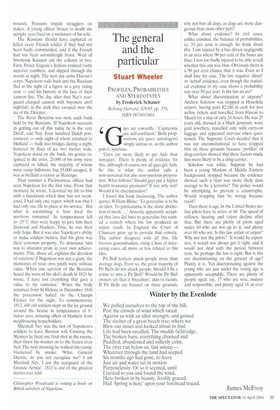To and from Russia without love
Christopher Woodward
1812: NAPOLEON'S FATAL MARCH ON MOSCOW by Adam Zamoyski HaTerCollins, £25, pp. 643, ISBN 0007123752 My Ladybird book of The Story of Napoleon had two pages to illustrate 1812. Napoleon sits on a white horse and watches Moscow burn, torched by fleeing Russians. Then the Grande Armee retreats, a column winding into a blurry, white oblivion. 'With the thermometer seventy degrees below freezing', read the text, 'few of those who had crossed the river Niemen into Russia in June ever got back to France.' But for a few images such as this — and War and Peace — not many English people know what actually happened. I didn't, until I read this magnificent book. Adam Zamoyski is the first writer in English to have properly researched Russian. Polish and French sources. No review can do justice to the scholarly integrity and human sensitivity of this book, or to the horrors it describes. I could not sleep after reading his description of the last days of the French retreat.
First. Zamoyski argues, war between Napoleon and Alexander was inevitable. Whatever the immediate causes — Poland. and trade with the British — Europe was not big enough for both of them. Napoleon believed that if his upstart empire was to survive, Paris had to be the undisputed capital of Europe while Alexander was convinced that it was Russia's destiny to advance west. Humiliated at Austerlitz, seduced by Napoleon's charm at Tilsit and tortured by guilt at his role in his father's assassination, the young Tsar had developed — in a weak. deluded and fatalistic way — a sense of a spiritual destiny as the saviour of Europe. 'Blood must flow again,' he wrote in the summer of 1811, moving an army to the border. Napoleon shouted about insults to his honour. Later, he admitted that the two had bluffed themselves 'into a position of two blustering braggarts who, having no wish to fight, seek to frighten each other'.
His army of soldiers from France and 15 allies entered Russia in June, as soon as hay for the horses had been harvested. The Russians lost every battle. Demoralised, they fled Moscow. In the middle of September Napoleon installed himself in apartments in the Kremlin vacated by Alexander a few weeks before, hanging up a portrait of his infant son and sleeping on an iron camp bed beneath the chandeliers.
By every rule of war, he had won. In Vienna and Berlin he had waited for the monarch to sue for peace. But the barbarians had burned their own ancient capital, abandoned their civilians, and would not answer his letters. He did not know what to do. Napoleon could not win, above all, because he did not know why he was fighting. There is nothing I want in Russia, he said; his objective was to force Alexander to be an ally once again, not to overthrow him. So he did not join with the Turks, free the serfs, or give Poland back its independence.
But what Zamoyski shows is that the idea of a Russian strategy to lure the French deep into the continent and await their destruction by the weather is a statesponsored myth. Alexander did not act because he was too weak to know what to do. Stalinist propaganda was to present Marshall Kutusov — grizzled, resilient and patient — as the expression of the soul of the Russian people. Here he comes across as a boastful and incompetent idiot. There was no people's uprising, and the Cossacks were vicious and cowardly looters, fleeing from any French soldier who could still point a rifle.
Zamoyski writes in a clear, understated way and — like a lecturer showing slides — uses eyewitness accounts to illustrate the human story. It is in those five weeks in Moscow that these images become hallucinatory. Whores parade in the ruins in court costumes of the 17th century. There is no bread, but tables are piled with champagne and macaroons. Napoleon begins to make mistake after mistake.
On 19 October 95,000 men marched out of Moscow, accompanied by up to 50,000 civilians in a column up to 100 kilometres in length. The first snow fell on 6 November. Two nights later men began to freeze to death. Many threw away bags of grain before their plunder. But why not? A princess's necklace would buy a farm back home. By the time the survivors crossed the Niemen on 12 December silver ingots lay ignored in the snow.
Perhaps sentimentally, I felt sorriest for the brave Italians for whom Napoleon — whatever his faults — represented modernity and freedom versus the ancien regime. 27,397 marched across the Alps towards Moscow. Less than 1,000 got back. A third of Napoleon's army of 600,000 did survive, many as deserters or prisoners. 400,000 Russian soldiers also died, and no one knows how many civilians. Yet it is not the statistics which make the description of the retreat one of the most vivid and horrifying passages of military history I have ever read. It is the candour with which the survivors, in their memoirs, wrote of how they were brutalised by hunger and cold.
There are a hundred images to pick from. Men wear fur pelisses looted for their wives, or priests' vestments looted from churches. A lost soldier lives on handfuls of snow soaked in horses' blood. An officer's butler drowns three babies whose screams keep him awake. Cossacks strip men naked to look for jewels, even the dressings on their wounds. Peasants impale stragglers on stakes. A young officer frozen to death sits upright, eyes fixed on a miniature of his wife.
The Russians should have captured or killed every French soldier if they had not been badly commanded, and if the French had not been astonishinOy brave. West of Smolensk Kutusov cut the column in two. First, Prince Eugene's Italians resisted vastly superior numbers, and slipped through the woods at night. The next day came Davout's corps. Napoleon rode back and the Russians fled at the sight of a figure in a grey riding coat — and his bravery in the face of their cannon fire. The day after that Ney's rearguard charged cannon with bayonets until nightfall; in the dark they escaped over the ice of the Dnieper.
The River Berezina was next, each bank held by the Russians. If Napoleon succeeds in getting out of this today he is the very Devil-, said Ney. Four hundred Dutch pontooneers — only eight of whom returned to Holland — built two bridges during a night, battered by floes of ice two metres wide. Napoleon stood on the bank, his genius reignited in the crisis. 25,000 of his army were captured or killed, the majority of whom were camp followers, but 55,000 escaped. It was as brilliant a victory as Marengo.
That summer a Piedmontese officer had seen Napoleon for the first time. From that moment, he wrote, 'I devoted my life to him with a fanaticism which time has not weakened. I had only one regret, which was that I had only one life to place at his service.' But what is astonishing is how loyal the survivors remained. As temperatures fell to -35°C they were happy to give him their firewood and blankets. True, he was their only hope. But it was also Napoleon's ability to make soldiers believe that his glory was their common property. To denounce him was to abandon pride in your own achievements. This, above all, explains the devotion of veterans: if Napoleon was not a giant, the memories of your own youth were without value. When one survivor of the Berezina heard the news of his idol's death in 1821 he
wrote, have lost everything that gave a value to my existence.' When the body returned from St Helena in December 1840 the procession halted on the Champs Elysees for the night. To commemorate 1812, 400 old soldiers slept on the icy ground around the hearse in temperatures of 8' below zero, refusing offers of blankets from neighbouring householders.
Marshall Ney was the last of Napoleon's soldiers to leave Russian soil. Crossing the Niemen he fired one final shot at the enemy, then threw his musket on to the frozen river bed. The next morning he walked into camp, blackened by smoke. 'What. General Dumas, do you not recognise me? I am Marshall Ney. I am the rearguard of the Grande Armee'. 1812 is one of the greatest stories ever told.
Christopher Woodward is writing a book on British admirers of Napoleon.



































































 Previous page
Previous page